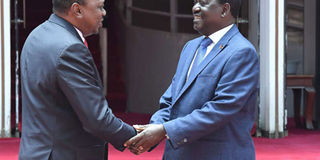Uhuru-Raila ceasefire: Echoes from previous deals can be heard in the air

President Uhuru Kenyatta and opposition chief Raila Odinga at Harambee House on March 9. PHOTO | FILE | NATION MEDIA GROUP
What you need to know:
- Kenyatta does not need power for he has it and is exiting the stage.
- Odinga does not have power and appears headed for the exit.
On March 1, exactly 170 years ago, a British MP named Henry John Palmerston, who later rose to become prime minister, made this statement in the House of Commons: “We have no eternal allies and we have no perpetual enemies. Our interests are perpetual and eternal, and those interests it is our duty to follow.”
Palmerston was stating UK foreign policy that long ago.
But he could easily have been talking about many a Kenyan politician’s world view today.
TORMENTOR
Mr Raila Odinga, Kenya’s political powerhouse and former premier, has had neither permanent political allies nor foes.
He has followed an eternal and perpetual quest called power.
When he did not get the presidency in the 1997 ballot, he aggressively courted President Moi, his tormentor.
This culminated in the dissolution of his National Development Party and merger with the governing Kanu in March 2002.
KANU DIEHARDS
Mr Odinga was named cabinet minister and Kanu’s Secretary-General but soon Mr Moi declared Mr Uhuru Kenyatta, and not Mr Odinga, his heir.
Piqued, Mr Odinga and many hitherto Kanu diehards quit Kanu.
But in October, Mr Odinga stole a match on everybody else. He endorsed Mr Mwai Kibaki as the opposition’s presidential candidate to the chagrin, especially of Mr Simeon Nyachae, with whom he had just signed a poll pact.
INTERVENTIONS
Mr Kibaki would become President but would not honour a Memorandum of Understanding agreed with Mr Odinga.
When the two found themselves on opposite ends of a referendum on a draft constitution in 2005, President Kibaki’s side lost.
He sacked Mr Raila & Co and ominously set the stage for the now infamous 2007 General Election.
Mr Odinga disputed the results of the presidential poll, triggering violence whose ramifications are felt and feared today.
Intervention by the international community resulted in a peace deal brokered by former United Nations Secretary-General Kofi Annan.
ICC CASES
It climaxed in the 2008 coalition government of President Kibaki and Prime Minister Odinga.
Enter 2013. Mr Kibaki was out of the running, a new Constitution was in place and Mr Kenyatta faced heinous crimes-against-humanity charges at The Hague arising from the 2007 post-election violence.
Many thought, as they did in 2007 when he assembled an awesome cast called the Pentagon, Mr Odinga was a shoo-in for State House.
The polls umpire declared Mr Kenyatta winner and the Supreme Court upheld the decision.
DESPOTIC
That only heralded the 2017 election cycle.
It was Kenya’s longest, featuring two presidential polls and a Supreme Court intervention that has galled and pleased protagonists equally.
Mr Odinga branded Mr Kenyatta an illegitimate head of a despotic government.
And then 12 days ago, Mr Odinga, illegally sworn in on January 30 as the people’s president, and Mr Kenyatta, the legally sworn President of the Republic on November 28, abruptly appeared together.
SIMILARITIES
It was at the same spot where Mr Annan spoke in February 2008 before President Kibaki and Mr Odinga.
The President’s and Mr Odinga’s words were almost similar to Mr Annan’s: "Ladies and gentlemen, we have a deal!"
The question is how different the March 9 deal is or is going to be from its predecessors?
The one with Kanu ended disastrously for it terminated the independence party’s 40-year stranglehold on power and ended with Odinga’s betrayal.
BRIDGES
The coalition government of President Kibaki and PM Odinga was defined by disunity, uncertainty and perpetual Executive infighting which cascaded into the rest of government and civil service.
The rapprochement between President Kenyatta and Mr Odinga presents an attractive forerunner to dialogue and platform for building bridges to a united Kenya.
The President and Mr Odinga would transcend personal, ethnic and sectarian differences to unite Kenya and put it on track to prosperity.
EXIT
But echoes from previous deals can be heard in the air.
What is certain is that Mr Kenyatta does not need power for he has it and is exiting the stage.
Mr Odinga does not have power and appears headed for the exit.
But can they have fought so fiercely for so long to just as suddenly cease everything in order to craft legacies on a united Kenya?
RUBBERSTAMP
The proof of the pudding will be in the eating.
I stand for a national dialogue and there is no evidence yet this deal is its precursor.
Until that happens, the March 9 deal appears a contract over Kenya between the President and Mr Odinga rubberstamped by Parliament.
Wait for the next steps.





